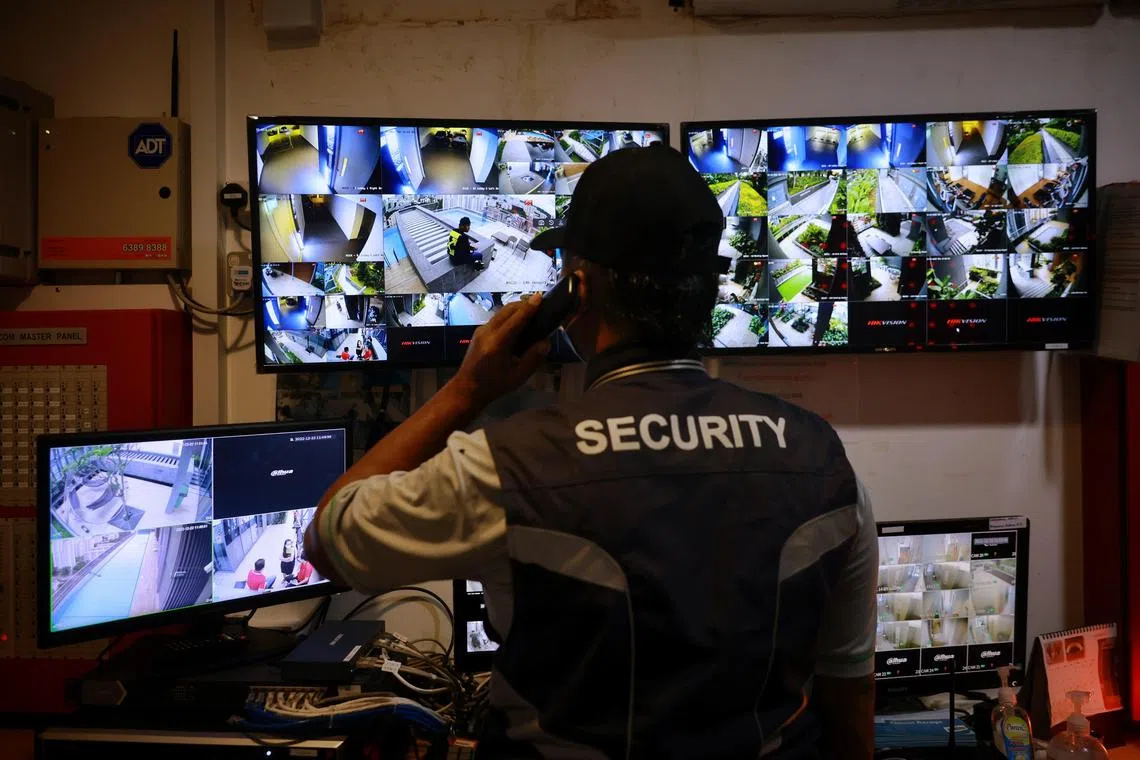Part-time security officers to see over 30% jump in hourly pay by 2028
Sign up now: Get ST's newsletters delivered to your inbox

Security officers in senior and supervisory roles will also see an hourly pay increase between 25 per cent and 30 per cent.
ST PHOTO: JASON QUAH
SINGAPORE - Part-time security officers will see their hourly pay rise by more than 30 per cent over the next four years under a new three-year plan to raise salaries in the sector.
The three-year schedule, which kicks in from January 2026, will see a part-time security officer’s hourly pay increase by 33.1 per cent by January 2028. Security officers in senior and supervisory roles will see hourly pay increases of between 25 per cent and 30 per cent over the same period.
For instance, a part-time security officer earning $10.10 an hour in December 2024 will receive an hourly pay of $13.45 by January 2028.
The sustained wage increases were announced in a joint media release by the Ministry of Manpower (MOM) and the Ministry of Home Affairs (MHA) on Dec 10.
The move is one of the recommendations made by the Security Tripartite Cluster – a workgroup comprising representatives from the Government, unions, industry associations, employers and service buyers – aimed at boosting the salaries of all security officers.
Under the Employment Act, part-time security officers work fewer than 35 hours a week. Ad-hoc officers are those who are hired for specific events.
Part-time security officers welcomed the move. Mr Idil Hakim, a 40-year-old part-time security officer from Ranger Investigation and Security Services, said the sustained hourly wage increase would be helpful for him, especially in funding some of his household-related and mortgage expenses.
While he has a full-time nine-to-six job as a deliveryman in the logistics sector, he works part-time as a security officer for extra income to support his family.
“It’s definitely going to help me, and the hourly pay raise is a good thing,” he said.
Responding to queries from The Straits Times, a spokesman for MOM said on Dec 13: “The Security Progressive Wage Model covers 18,300 security officers employed by security agencies, of which 2,300 are on part-time work arrangements.”
First implemented in 2016, the Security Progressive Wage Model (PWM) provides a wage ladder for security officers, increasing their wages and implementing training requirements for security officers who are Singaporeans or permanent residents.
Under the wage ladder that kicked in on Jan 1, 2024, full-time security officers now receive at least $2,650 in basic monthly pay, compared with at least $1,650 before Jan 1, 2024. By 2028, the basic monthly pay of entry-level security officers will increase to $3,530, a 33 per cent jump.
The latest move announced on Dec 10 raises the salaries on the wage ladder for part-time and ad-hoc security officers from Jan 1, 2026 to Dec 31, 2028.
The PWM is a wage ladder tied to skill and productivity improvements currently in place for lower-wage workers in seven sectors and two occupations, with wage floors at each rung increasing according to a pre-determined schedule.

Mr Raj Joshua Thomas, president of Security Association Singapore, said the association strongly supports the significant increases in the PWM wage floors for part-time security officers over the next few years. “The hourly rates for part-time security officers will rise proportionately to the increase in the PWM wage floors, as outlined in the Security Tripartite Cluster’s statement,” he said.
He urged buyers of security services to choose security agencies that provide better hours and benefits for their officers, encouraging security agencies to move towards a five-day work week by 2030. Security officers typically work six days a week or alternate between five and six days a week, he said.
“Many buyers still choose the lowest bids, which means that their chosen vendor can only pay the lowest wage under the PWM with officers working the maximum hours,” said Mr Thomas, who is also a Nominated Member of Parliament.
He also cautioned against illegal practices that unlawfully lower the costs of hiring security officers, such as hiring Malaysian security officers who work more than 12 hours or not making Central Provident Fund contributions for them.
“I appeal to security officers to choose agencies that can give them the lowest working hours for the same PWM wage or higher. Officers should not remain in agencies that have no plan to move to a five-day work week by 2030.”
NTUC said in a short statement on Dec 11 that it is part of the Security Tripartite Cluster and it is pleased that the recommendations of the cluster have been accepted by the Government.


